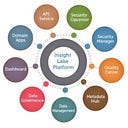Member-only story
Best Practices in Integrating Lakehouse and GenAI Technology Stacks
4 min readJan 15, 2025
As enterprises strive to derive actionable insights from their vast data repositories, the convergence of Lakehouse architectures and Generative AI (GenAI) solutions presents a powerful opportunity. This blog delves into the best practices for integrating Lakehouse technology with GenAI stacks, focusing on Databricks, LangChain, and Enterprise Retrieval-Augmented Generation (RAG) foundation architectures.
1. Unified Governance Strategy for Business Intelligence (BI) and AI Agents
Governance plays a pivotal role in ensuring that both BI processes and AI agents adhere to security, compliance, and data quality standards. Here’s how to approach governance effectively:
- Data Ownership and Stewardship: Define clear ownership for datasets within Databricks Unity Catalog. Assign roles for Data Owners, Data Stewards, and Data Consumers to maintain accountability.
- Access Control Policies: Implement fine-grained access control using Unity Catalog’s permission layers to segregate sensitive data from open datasets.
- Compliance Audits: Regularly audit the access logs and ensure that GenAI queries and agent interactions comply with regulatory requirements.
